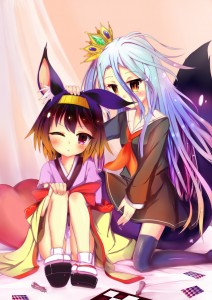
Since 2014 is coming to a close and I don’t plan on covering any more games for this year, it’s time to take a look at which Japanese video games were the most enjoyable.
1. Pocket Monsters (Pokémon) Omega Ruby/Alpha Sapphire
Since I recently wrote a review on the remakes, I won’t focus on this game too much. To me, this game is better than X and Y since it felt more polished and you can catch almost all the Pokémon (if you have both versions). The only thing that bothered me is the lack of trainer customization. Hopefully, it will return in the next game considering that many players liked that featured.
2. Atelier Shallie
To me, I consider Shallie the departure of having to manage time since the game has no time limit. While I haven’t played Mana Khemia 2, this game feels more like it with the battle system. Not only that, Shallie is the first Atelier game where you can explore the whole environment. In addition, there are new ways to gather items such as mining or fishing. While the synthesizing aspect of the game is simplified, it’s still powerful since you can pick whatever skills to use without having to decide on the order of the ingredients.
Although I’m more than halfway done with the story (I left off at Chapter 7), I admit that most of the characters are really enjoyable. Unlike Escha and Logy, the two protagonists (Shallistera and Shallotte) have noticeably different stories (after Chapter 4, the story converges with the other protagonist joining your party). To me, Shallotte was the most enjoyable because of her personality (besides the fact that she is voiced by Uesaka Sumire). Even so, I had mixed feelings with the Life Task system since it does not necessarily give you complete freedom. Once you filled up the meter, the game will start penalizing you through a gradual drop of the motivation meter if you don’t advance to the next chapter. Despite this and a few game-breaking bugs they fixed shortly after, I think Shallie is a very enjoyable game in the Dusk Trilogy and probably better than Escha and Logy in some aspects.
3. The Idolmaster One for All
It has been a while since an Idolmaster game came out. It seems that Bandai Namco was focusing more on mobile social games that I don’t play (in general, I have a strong dislike for mobile/smart phone games). Although I did not get this game at launch, I admit that this game was a noticeable improvement over Idolmaster 2 since you can produce all the idols in one save game and it removes some of annoying aspects of the previous game such as the inability to appeal when an opponent performs a burst appeal, mandatory events and having to maintain the Danketsu level. In short, One for All is a free produce version of Idolmaster 2 with more gameplay mechanics such as skills, ability to have more than 6 memory appeals, bust counters, etc.
In a recent update, you can also experience additional stories that involve the whole group or a specific idol. Of course, they are not free since this is Namco we are talking about here. Aside from that, Idolmaster One for All is a very enjoyable game and I can’t wait to see what they will have in store for the next installment for the PlayStation 4.
4. Neptune Rebirth 2 Sister’s Generation
Compared to the first remake, the second Rebirth remake was more polished and it’s noticeable with the ridiculously smooth frame rate. Since the story did not change that much (besides Red replacing Nippon Ichi and Broccoli replacing Gust), this game felt more like an enhanced port than a remake, which is not a bad thing. To one’s dismay, the Lilly Rank grinding is still there and considering that there are more than two endings, you are going to be there for a while. However, the disk making system can help in that regard.
5. Atelier Ayesha Plus
While Atelier Ayesha Plus is technically not a new game, I never got the chance to play it since I wanted to wait for the Vita version. I have to say that Gust (or rather Koei Tecmo) done a better job with Ayesha Plus compared to previous Plus releases as this game did not crash compared New Rorona, Meruru Plus and Totori Plus. Although there were a few graphical glitches, I didn’t encounter any bugs that were game breaking. Plus, I liked the costume selection, which comes at no surprise since Ayesha is pretty and adorable.
This wraps up my list of Japanese games that I enjoyed the most. Unlike last year, I couldn’t any game that I found disappointing. As for next year, I have a good number of games to cover next year, so stay tuned.
With that, what Japanese games you played this year that you found enjoyable? Which ones did you find disappointing? Feel free to share any games (Japanese or localized release) that you look forward to playing next year.

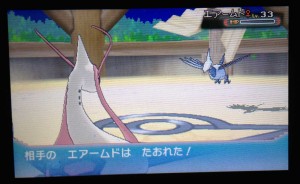
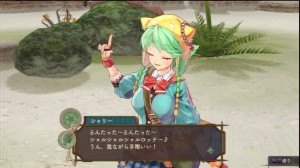
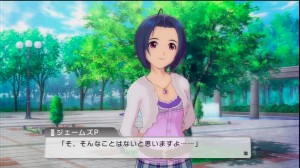
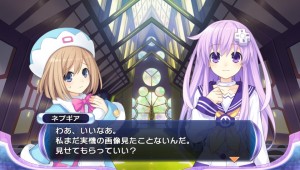
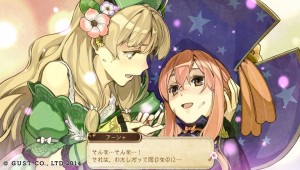

Hoping the upcoming Neptunia trilogy will have the enhanced Vita ports instead of re-releasing the original PS3 versions. Same goes for the upcoming Arland trilogy.
Hoping BN will have the balls to risk importing Idolm@ster games in the West. I’m sure they’ll still make money with the shounen anime games so I doubt it’ll be a major loss.
Looking forward to Shallie when it gets here.
I have played the Vita ports and of course, they have more features. Sure, Totori felt more like a port, but Meruru changed one of the endings with a few more cut scenes tying to the time warp arc in New Rorona for the after game. As for the Neptune remakes, while I don’t plan on getting the victory port until the near future, Rebirth 1 and 2 have notable changes (especially the former). The second had a few more endings from what I recalled.
But yes, I plan on importing Senran Kagura Estival Versus that releases in March for the Vita since I don’t have a PS4 yet. Of course, there are other 5 games to start as well.